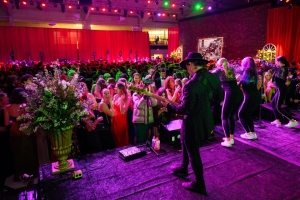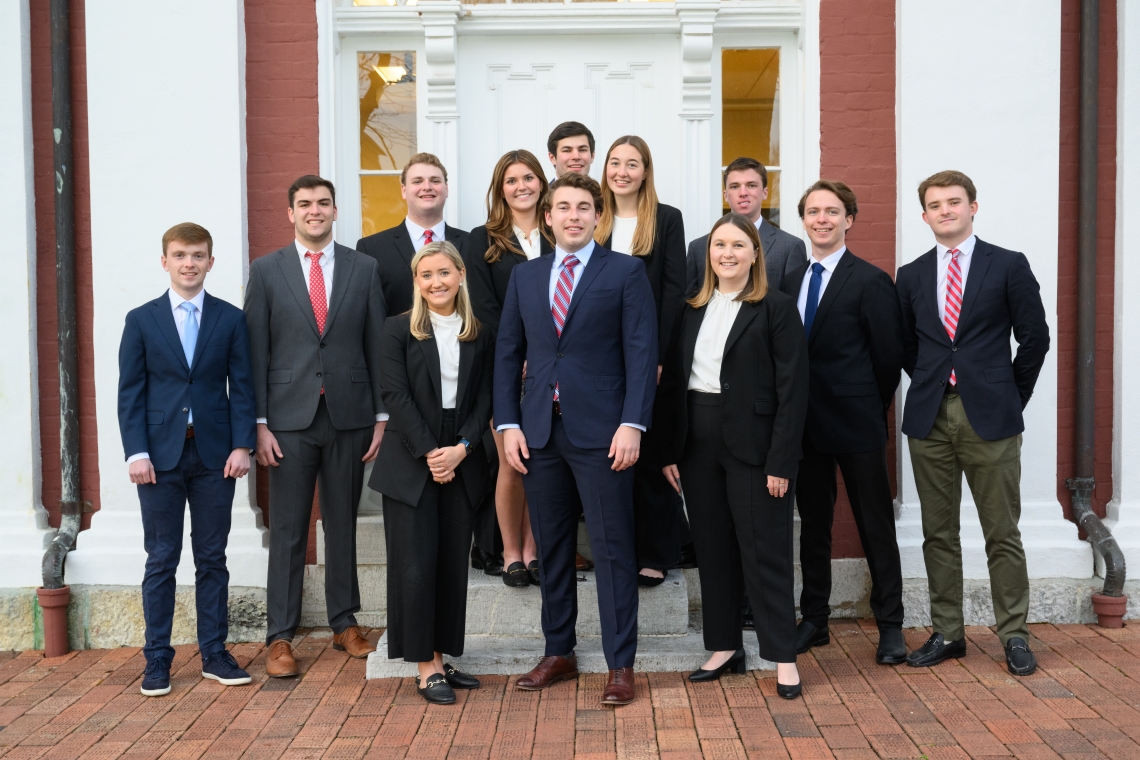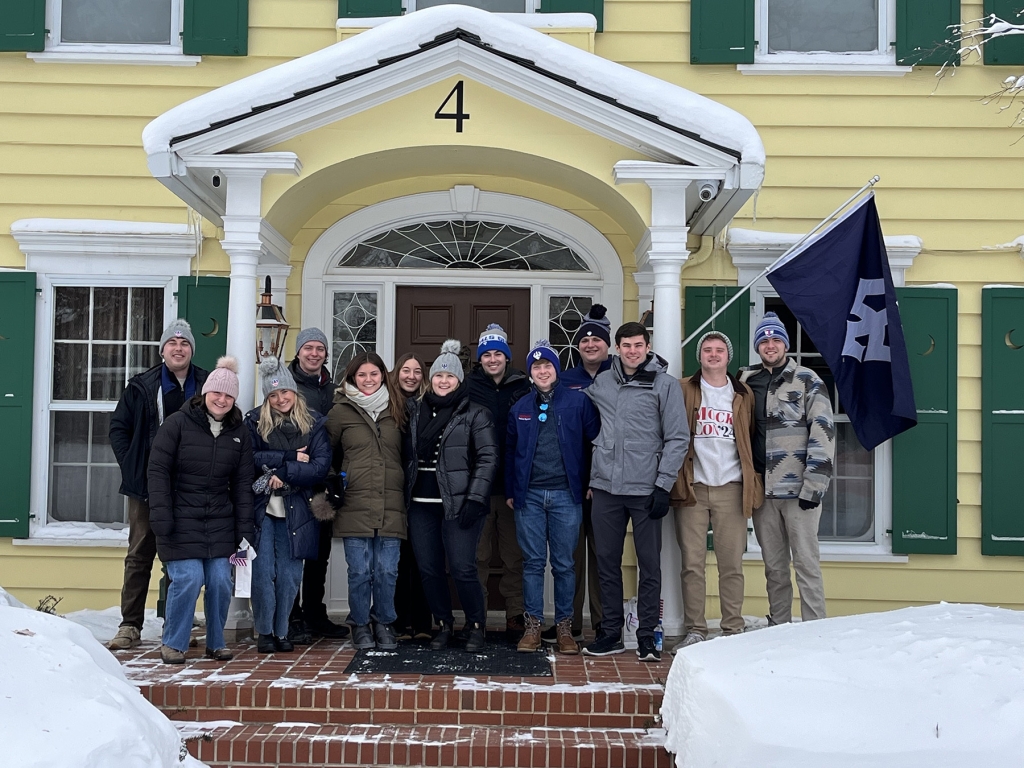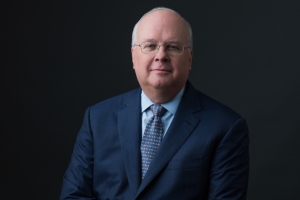
Mock Con Math Washington and Lee University’s 2024 Mock Convention political team has worked tirelessly behind the scenes to crunch the numbers for the latest presidential nominee prediction.
“This will be the most well-informed and most accurate prediction of its kind in the country.”
~ Brian Alexander, associate professor of politics
For Mock Con 2024’s political department, the road to the 2024 convention has been all about the research.
Mock Convention, which will be held Feb. 9-10, is a simulated presidential nominating convention held on Washington and Lee University’s campus every four years, focusing on the party currently out of power in the White House. Its goal is to predict the candidate that party will nominate to run for president of the United States. At its core, the convention is an experiment by the W&L undergraduate student body that is designed to inform students and the public of the state and history of U.S. politics, providing valuable context for current political affairs and discourse within the framework of an academic community. The convention, founded in 1908, is one of the university’s longest-running traditions and is also the nation’s most accurate mock political nominating convention, with 74% accuracy over its 116-year history. They have not missed a Republican cycle, however, in over 75 years.
The convention’s leadership team most recently returned from attending the Iowa caucus, an experience that allowed the team to employ their boots-on-the-ground approach to campaign outreach and get a front-row seat to democracy in action. Foster Harris ’24, a junior from Charlotte, North Carolina, majoring in American politics and who serves as Mock Convention’s political chair, said the team’s proactive approach to campaign outreach was essential for understanding the work ahead and the conversations happening inside the many campaigns it has tracked throughout the election cycle.
“We knew early on that we wanted to have an extensive outreach operation for this cycle,” Harris said, “and we were able to make contacts with the senior advisers on every single major campaign.”
Avery Lynch ’24 is Mock Con’s political outreach chair, a new role added to the political team for the 2024 convention. Lynch, a politics major with a law, justice and society minor from Charlotte, North Carolina, said the complexity of the Republican primary process makes it more challenging to predict outcomes than the Democratic cycle, and that having campaign contacts has been as instrumental as polling data as the team grapples with their decision.
“We worked on professionalizing outreach for the campaign by creating logging sheets, documents and checkpoints to track progress and keep track of campaign contacts,” Lynch said. “This election cycle has been very interesting and nuanced, to say the least, and so that information has been very helpful. We’ve cultivated contacts in campaigns that we can now rely on to call and ask questions as various things develop, which we then filter back to the rest of the political department and Foster [Harris].”
As head of the convention’s largest department, Harris is responsible for the distribution and management of more than 1,500 student delegates. Harris has worked diligently with his team in recent weeks to respond to polling data, primary and caucus results and real-time updates from campaigns to gather as much information as possible heading into their convention weekend prediction. The department’s strategy consists of a holistic data, rules and outreach approach, involving everyone from delegates to state chairs, to those on the political steering committee. While the delegations spearhead local outreach, emphasis is also placed on national trends and prevalent issues within the party. The department’s policy focus is embodied by the party platform, which is compiled and published by the political team the weekend of the convention.
Mock Convention’s political platform chair is Claire Cerone ’24, a politics major with minors in law, justice and society and mass communications from North Potomac, Maryland. In this role, Cerone and her team have been tasked with creating a policy platform that closely resembles that of the Republican Party’s platform, juggling policy divides between the candidates and talking with key decision-makers to complement their research. Cerone led a team of five other students on the platform committee, working closely together for over a year in crafting what would become the 50-page platform document that will be unveiled at the convention. Cerone also assisted with some legal analysis for the team, researching a few of the legal cases former President Donald Trump is involved in and how they could impact a potential nomination.
Cerone said she learned the value of teamwork and group dynamics throughout the process and believes her Mock Con experience will serve her well in the future.
“I really want to pursue a career in health policy, so the platform was a unique way to explore health-related issues that currently matter to the Republican Party,” Cerone said. “Of course, I was researching and writing about a variety of issues for the platform, but it was useful to also investigate what is being legislated on in terms of healthcare. The same went for my team—at the beginning, they told me their policy interests and I did my best to assign them planks (mini sections in the platform) that directly or loosely related to those interests. I found that people often produce better, higher quality work when they are writing about topics that fascinate them.”
Scott Hoover, A. Stevens Miles Professor of Banking and Finance and one of Mock Con’s co-advisers, said this year’s Mock Con leadership was well-served by their consistent work ethic and passion for the process.
“From day one, they chose to live and breathe Mock Con, and that approach has not waned,” Hoover said. “Another strength is that they often disagree with each other, which leads to healthy debate and a deeper discussion of the key issues. A third strength is their rare intellectual firepower. As an adviser, I have spent very little time teaching them. Instead, I just raise issues and let them figure out the best responses to those issues.”
When Florida Gov. Ron DeSantis’ recent exit from the race narrowed the field considerably, Mock Con students responded by adding a new predictive element to the convention. They are now researching the vice-presidential possibilities and will be offering a prediction on the likely vice-presidential nominee along with the presidential nominee.
The team has also had to grapple with unprecedented events, including the Supreme Court hearing an appeal of a Colorado Supreme Court ruling that Trump is disqualified from running. Oral arguments in that case begin on Feb. 8, the day before Mock Convention begins.
“We are prepared for all potential court outcomes, and our outreach operation really comes into play here,” Harris said, “because this is a situation where data cannot tell you anything except for who might be a second-choice candidate in a state if Trump won’t be on the ballot. State GOP leadership could work together with the RNC to keep Trump on the ballot through a party-run process if he is disqualified, and our state chairs are talking to county chairs, district chairs, town chairs and those serving in the GOP leadership in every single state. The results of that information-gathering exercise are going to inform how we look at the rest of our data.” Members of the political team wrote a blog post on the convention’s website before the team’s departure to Iowa that provides a more detailed analysis.
Henry Haden ’25, a business administration and Spanish double-major from Atlanta, serves as the convention’s Republican party analyst.
“I’ve enjoyed getting to know how rules ultimately dictate, in large part, the outcome of the primary process,” Haden said. “This can extend to delegate allocation, whether proportional or winner-take-all. Also, each state’s fight to get earlier in the primary calendar has an impact on the ultimate momentum of the race.”
Haden said the role has also allowed him to appreciate the value that having a foundation of legal knowledge has when entering the political arena.
“Whether it be party rules or state rules, all can sway the outcome of the race one way or another,” Haden said. “Having observed this, I am eager to explore law and policy further after college.”
Jake Winston ’24, a Holly Springs, North Carolina, history major and education studies minor, serves as Mock Con’s national political analyst. While others on the political team are focused regionally or by state, Winston is tasked with looking at the whole race from the national level. Winston said he studies polls in depth to understand candidate viability and, he said, “to look beyond the headline-producing numbers.”
Winston said polling is key to the team’s approach, as this data provides them with the raw numbers to visualize how much support candidates have from state to state, but that polling is not an exact science.
“I have learned at a more intense level how messy campaigns can be and how much opinions can actually change in American politics,” Winston said. “Look back at Trump and DeSantis’ polling numbers just 10 to 12 months ago and where we stand today–a lot can change.”
Winston plans on pursuing a career in teaching after graduation and plans to utilize his Mock Con experience in the classroom.
“I hope to translate my experience with Mock Convention into future classrooms, whether it be through simulations with students or just a better understanding of our political process,” Winston said. “Currently, I am student teaching at Lylburn Downing Middle School in Lexington, and I have had students predict who will win each state the night before the two primaries thus far.”
Mock Con co-adviser Brian Alexander, associate professor of politics at W&L, said the political team’s task was no less academically rigorous because of the presumed likelihood of Trump’s nomination.
“This will be the most well-informed and most accurate prediction of its kind in the country–probably all year long, but definitely on the day of,” Alexander said.
Go to www.mockconvention.com to learn more about the history of the convention.
 The 2024 Mock Con political team has poured countless hours researching their prediction. From left to right of top: Henry Haden ’25, Beau Hancock ’26, Jake Winston ’24, Avery Lynch ’24, Patrick France ’25, Kate Hannon ’24, Robert Mish ’24, Connor McNamara ’24, Ford Webb ’25. Bottom: Claire Cerone ’24, Foster Harris ’24, Pierson Gammage ’24
The 2024 Mock Con political team has poured countless hours researching their prediction. From left to right of top: Henry Haden ’25, Beau Hancock ’26, Jake Winston ’24, Avery Lynch ’24, Patrick France ’25, Kate Hannon ’24, Robert Mish ’24, Connor McNamara ’24, Ford Webb ’25. Bottom: Claire Cerone ’24, Foster Harris ’24, Pierson Gammage ’24 The political team braved ice and snow to attend the Iowa caucus in January.
The political team braved ice and snow to attend the Iowa caucus in January.

You must be logged in to post a comment.